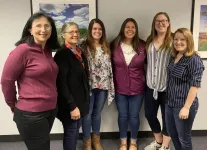Blood sugar highs and lows linked to greater dementia risk in type 1 diabetes
Risk may be 6 times higher for those experiencing both
2021-06-02
(Press-News.org) MINNEAPOLIS - Older people with type 1 diabetes who have been to the hospital at some point for both low and high blood sugar levels may be at six times greater risk for developing dementia years later. The research is published in the June 2, 2021, online issue of Neurology®, the medical journal of the American Academy of Neurology. The study also found that people with type 1 diabetes who visit the hospital for just one of the blood sugar extremes may also be at greater risk for developing dementia.
Type 1 diabetes is a chronic condition in which the pancreas produces little or no insulin.
Hypoglycemia is low blood glucose, or the main sugar in blood, that may result in loss of consciousness. Hyperglycemia results from insulin deficiency or extremely high blood sugar and dehydration. This study looked at severe glycemic events, which were defined as episodes of high or low blood sugar that resulted in an emergency room visit or hospital stay.
"For people with diabetes, both severely high and low blood sugar levels are emergencies and both extremes can largely be avoided. However, when they do occur, they can lead to coma, increased hospitalization and even death," said study author Rachel A. Whitmer, PhD, of the University of California Davis School of Medicine in Sacramento, Calif. "People with type 1 diabetes are living longer than before, which may place them at risk of conditions such as dementia. If we can potentially decrease their risk of dementia by controlling their blood sugar levels, that could have beneficial effects for individuals and public health overall."
The study looked at 2,821 people with an average age of 56 who had type 1 diabetes. Of those, 398, or 14%, had a history of severe low blood sugar; 335, or 12%, had a history of severe high blood sugar and 87, or 3%, had both. Researchers followed up with the people for an average of seven years to determine who had been diagnosed with dementia.
Researchers found that 153 people, or about 5%, developed dementia. After adjusting for age, sex and ethnicity, the people with low blood sugar events had a 75% greater risk of developing dementia than those without one. People with high blood sugar events had more than twice the risk of developing dementia than those without one.
However, the people who experienced both types of events had more than six times the risk of developing dementia than people who had neither event.
Researchers also looked at dementia incidence rates. After adjusting for age, the incidence rate of dementia in people with low blood sugar events was 26.5 cases for every 1,000 person-years compared to 13.2 for people without. Person-years take into account the number of people in a study as well as the amount of time spent in the study. The incidence rate of dementia in people with high blood sugar events was 79.6 cases for every 1,000 person-years, compared to 13.4 for people without.
For people who had both high and low blood sugar events at various times, the incidence rate of dementia was 98.5 for every 1,000 person-years, compared to 12.8 for those who had neither.
"Our findings suggest that exposure to severe glycemic events may have long-term consequences on brain health and should be considered additional motivation for people with diabetes to avoid severe glycemic events throughout their lifetime," Whitmer said.
A limitation of the study is that people had to be diagnosed with dementia by a health care provider to be counted as having dementia. Since many dementia cases go undiagnosed, this may have resulted in underreporting the number of dementia cases. Whitmer noted that the study was not designed to determine whether high and low blood sugar events caused dementia. It only showed an association.
INFORMATION:
The study was supported by the National Institutes of Health.
Learn more about brain health at BrainandLife.org, home of the American Academy of Neurology's free patient and caregiver magazine focused on the intersection of neurologic disease and brain health. Follow Brain & Life® on Facebook, Twitter and Instagram.
When posting to social media channels about this research, we encourage you to use the hashtags #Neurology and #AANscience.
The American Academy of Neurology is the world's largest association of neurologists and neuroscience professionals, with over 36,000 members. The AAN is dedicated to promoting the highest quality patient-centered neurologic care. A neurologist is a doctor with specialized training in diagnosing, treating and managing disorders of the brain and nervous system such as Alzheimer's disease, stroke, migraine, multiple sclerosis, concussion, Parkinson's disease and epilepsy.
For more information about the American Academy of Neurology, visit AAN.com or find us on Facebook, Twitter, Instagram, LinkedIn and YouTube.
ELSE PRESS RELEASES FROM THIS DATE:
2021-06-02
URBANA, Ill. -When pigs get hit with significant illnesses during key stages of pregnancy, their immune response may negatively affect developing piglets, making them less productive on the farm. New research from the University of Illinois shows that when those piglets - especially males - experience a second stressor in early life, they are at higher risk of neurodevelopmental and other neurological anomalies, putting them at an even greater disadvantage in production settings.
"With more information about maternal illness, what we call maternal immune activation, we can make better decisions about how to handle these types of immune challenges within animal production settings," says Marissa Keever-Keigher, doctoral student ...
2021-06-02
In a new study, University of Maine researchers found that culture helps humans adapt to their environment and overcome challenges better and faster than genetics.
After conducting an extensive review of the literature and evidence of long-term human evolution, scientists Tim Waring and Zach Wood concluded that humans are experiencing a "special evolutionary transition" in which the importance of culture, such as learned knowledge, practices and skills, is surpassing the value of genes as the primary driver of human evolution.
Culture is an under-appreciated factor in human evolution, Waring ...
2021-06-02
Icebergs crumbling into the sea may be what first come to mind when imagining the most dramatic effects of global warming.
But new University of Arizona-led research, published in Geophysical Research Letters, suggests that more record-breaking temperatures will actually occur in the tropics, where there is a large and rapidly growing population.
"People recognize that polar warming is much faster than the mid-latitudes and tropics; that's a fact," said lead study author Xubin Zeng, director of the UArizona Climate Dynamics and Hydrometeorology Center and a professor of atmospheric sciences. "The second fact is that the warming over land is greater than over ...
2021-06-02
People of color are more than twice as likely to die after a traumatic brain injury as white people, according to a new retrospective review from Oregon Health & Science University.
The study published today in the journal Frontiers in Surgery.
In the report, "Racial and Ethnic Inequities in Mortality During Hospitalization for Traumatic Brain Injury: A Call to Action," the researchers analyzed more than a decade of data related to the health outcomes and demographics of thousands of patients treated for traumatic head injuries at OHSU Hospital, one of two Level 1 trauma centers in the state.
They found a clear delineation of worse outcomes for people of color.
"We have a societal and professional duty to recognize and accept that the effects of structural ...
2021-06-02
Hydrogels are commonly used inside the body to help in tissue regeneration and drug delivery. However, once inside, they can be challenging to control for optimal use. A team of researchers in the Department of Biomedical Engineering at Texas A&M University is developing a new way to manipulate the gel -- by using light.
Graduate student Patrick Lee and Dr. Akhilesh Gaharwar, associate professor, are developing a new class of hydrogels that can leverage light in a multitude of ways. Light is a particularly attractive source of energy as it can be confined to a predefined area as well as be finetuned by the time or intensity of light exposure. Their work was recently published in the journal Advanced Materials.
Light?responsive hydrogels are an ...
2021-06-02
OAKLAND, Calif. -- In patients with insulin-treated type 2 diabetes, the use of continuous glucose monitors is associated with better blood sugar control and fewer visits to the emergency room for hypoglycemia, a Kaiser Permanente study published June 2 in the journal JAMA found.
The monitors have previously been shown to improve glucose control for patients with type 1 diabetes. Continuous glucose monitors are now the standard of care for these patients.
"The improvement in blood sugar control was comparable to what a patient might experience after starting a new diabetes medication," said the study's lead author Andrew J. Karter, PhD, a senior research scientist with the Kaiser Permanente Northern California ...
2021-06-02
What The Study Did: Researchers investigated the effect of real-time continuous glucose monitoring on glycemic control among patients with insulin-treated diabetes.
Authors: Andrew J. Karter, Ph.D., of Kaiser Permanente in Oakland, California, is the corresponding author.
To access the embargoed study: Visit our For The Media website at this link https://media.jamanetwork.com/
(doi:10.1001/jama.2021.6530)
Editor's Note: The article includes conflict of interest and funding/support disclosures. Please see the article for additional information, including other authors, author contributions and affiliations, conflict of interest and financial disclosures, and funding and support.
INFORMATION:
Media advisory: The full study and editorial ...
2021-06-02
BAR HARBOR, MAINE — Many salamanders can readily regenerate a lost limb, but adult mammals, including humans, cannot. Why this is the case is a scientific mystery that has fascinated observers of the natural world for thousands of years.
Now, a team of scientists led by James Godwin, Ph.D., of the MDI Biological Laboratory in Bar Harbor, Maine, has come a step closer to unraveling that mystery with the discovery of differences in molecular signaling that promote regeneration in the axolotl, a highly regenerative salamander, while blocking it in the adult mouse, which is a mammal with limited regenerative ability.
"Scientists at ...
2021-06-02
Researchers from Carnegie Mellon University's Computational Biology Department in the School of Computer Science have developed a new process that could reinvigorate the search for natural product drugs to treat cancers, viral infections and other ailments.
The machine learning algorithms developed by the Metabolomics and Metagenomics Lab match the signals of a microbe's metabolites with its genomic signals and identify which likely correspond to a natural product. Knowing that, researchers are better equipped to isolate the natural product to begin developing it for a possible drug.
"Natural products are still one of the most successful paths for drug discovery," said Bahar Behsaz, a project scientist in the lab and lead author of a paper about the process. "And ...
2021-06-02
A team of Colorado State University scientists, led by veterinary postdoctoral fellow Dr. Anna Fagre, has detected Zika virus RNA in free-ranging African bats. RNA, or ribonucleic acid, is a molecule that plays a central role in the function of genes.
According to Fagre, the new research is a first-ever in science. It also marks the first time scientists have published a study on the detection of Zika virus RNA in any free-ranging bat.
The findings have ecological implications and raise questions about how bats are exposed to Zika virus in nature. The study was recently published in Scientific Reports, a journal published by Nature Research.
Fagre, a researcher at CSU's Center for Vector-Borne Infectious Diseases, ...
LAST 30 PRESS RELEASES:
[Press-News.org] Blood sugar highs and lows linked to greater dementia risk in type 1 diabetes
Risk may be 6 times higher for those experiencing both



